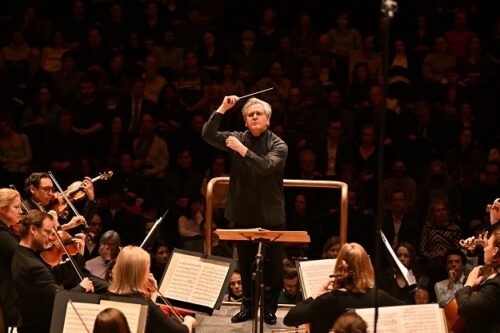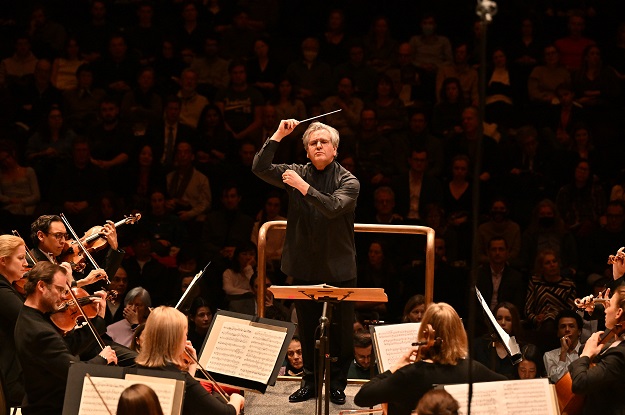 United Kingdom Coleridge-Taylor, Liszt, R. Strauss: London Symphony Orchestra / Sir Antonio Pappano. Barbican Hall, London 12.2.2023. (MBr)
United Kingdom Coleridge-Taylor, Liszt, R. Strauss: London Symphony Orchestra / Sir Antonio Pappano. Barbican Hall, London 12.2.2023. (MBr)

Coleridge-Taylor – Ballade in A minor, Op.33
Liszt – Die Ideale
R. Strauss – Ein Heldenleben
London’s major orchestras have had a long history of choosing opera music directors to lead them, especially over the last half century. This is especially the case with the London Symphony Orchestra – Antonio Pappano will be the LSO’s fourth principal conductor with such a background since Claudio Abbado in 1979. This concert showcased why a Pappano legacy with the orchestra might be a special one – it is about beauty, it is about sound, and it is about why a symphony orchestra doesn’t need to be, well, just like a symphony orchestra.
It is true that not everything on this programme was well-suited to showing us this. Liszt’s Die Ideale is, frankly, an horrendous piece of music – the penultimate of the composer’s thirteen symphonic poems. It is, of course, just this writer’s view that Liszt really couldn’t compose great music for the symphony orchestra. Die Ideale – originally written in 1857 to commemorate the unveiling in Weimar of a double statue of Friedrich Schiller and Johann Wolfgang Goethe – is less about the event and more about what one might feel from reading Schiller’s poem Das Ideal und das Leben (The Actual and the Ideal Life). No matter how hard Pappano tried, and no matter how exquisitely crafted the LSO played this twenty-five-minute piece, rather than attempting to reconcile the intellect and the soul, or to somehow seek to define the conflict between mankind’s struggles and his desire for perfection, it felt like sitting through a gloriously read, but utterly dull, narration of Kant’s Kritik der reinen Vernunft. Indeed, the Maestoso last movement of the Liszt (although the work is played without breaks) had a kind of ‘Kantean’ density but still managed to sound undeniably impressive – although it would have been a cruel irony had the LSO somehow expended so much of their collective power here that they had insufficient in reserve for the work after the interval, Ein Heldenleben.
But no. And what a performance of Strauss’s magnificent tone poem we got. This was, in almost every way, a markedly superior Heldenleben to an outstanding one given by Mariss Jansons and the Bavarian Radio Symphony Orchestra in January 2019 at the Barbican. It was precisely Pappano’s ear for drama – the Verdian storm which he brought to the opening of ‘Der Held’ – how rarely have these horns sounded so emphatic, hammered in with such force, for example? How often have Strauss’s critics sounded as scorching, as acerbic, as sheerly vicious as they did in this performance? There was nothing meek about the woodwind here – the vindictiveness in the oboe, clarinet and flute was savage. Strauss depicts his wife, Pauline, in a quite extraordinary violin solo in ‘Des Helden Gefährtin’, and Roman Simovic’s was one of the most ravishing I have ever heard – and I have heard many, many performances of this work. What was remarkable about it was the complete distortion of time – Pappano lavished on Simovic all the space he wanted, all the love of a great operatic aria. Simovic would, in turn, spin lines that were tonally rich, uncharacteristically balletic for this work. It was flawless but entirely, endlessly creative. Simovic’s Pauline was invented to sing through this Heldenleben; she was here to quell, even to seduce, the ardent and heroic Strauss.

Pappano’s willingness to highlight ‘voices’ in the score proved to be peerless. The harps emerged with astounding clarity – never a forgone conclusion in this work. Even the percussion was given an identity – the cymbals that whispered and hissed like serpents, the resonant but baritonal timpani. ‘Des Helden Walstatt’, with a chorus of trumpets off-stage, lacked nothing in clarity. Best of all, Pappano was simply glorious in ‘Des Helden Friedenswerke’, pulling back almost in sostenuto – much as Barbirolli would have, and whom Pappano is so resembling these days – to let the orchestra’s strings sing that great love theme; it was a spellbinding moment. With magnificent horns at the end – especially the golden solo of Diego Incertis Sánchez – this had been a radiant performance. In many ways, it was one which set a benchmark for a very human, very operatic kind of way of interpreting this endlessly fascinating masterpiece.
Maybe, however, it was always going to be this way. The concert had opened with Samuel Coleridge-Taylor’s Ballade in A minor, Op. 33. It is a relatively early work by Coleridge-Taylor (1898) – although since he died in 1925, at just 37, this isn’t really saying very much. A better composer – or a slightly older Samuel – would probably have edited down the work but would almost certainly not have touched the two exquisite slow sections. The inspiration is Elgarian – no doubt about it – and Pappano got from the LSO strings playing of astonishing beauty. I would be hard-pressed, in fact, to say I have ever heard the LSO strings sound better than this – they almost sounded as if they were free-bowing in that kind of Stokowski way; the sheen was just pure silk, but with a magical richness of tone carefully layered on top.
The Liszt aside, this concert had been special. But more than that it is, I think, a preview to what could be one of the great musical partnerships.
Marc Bridle
